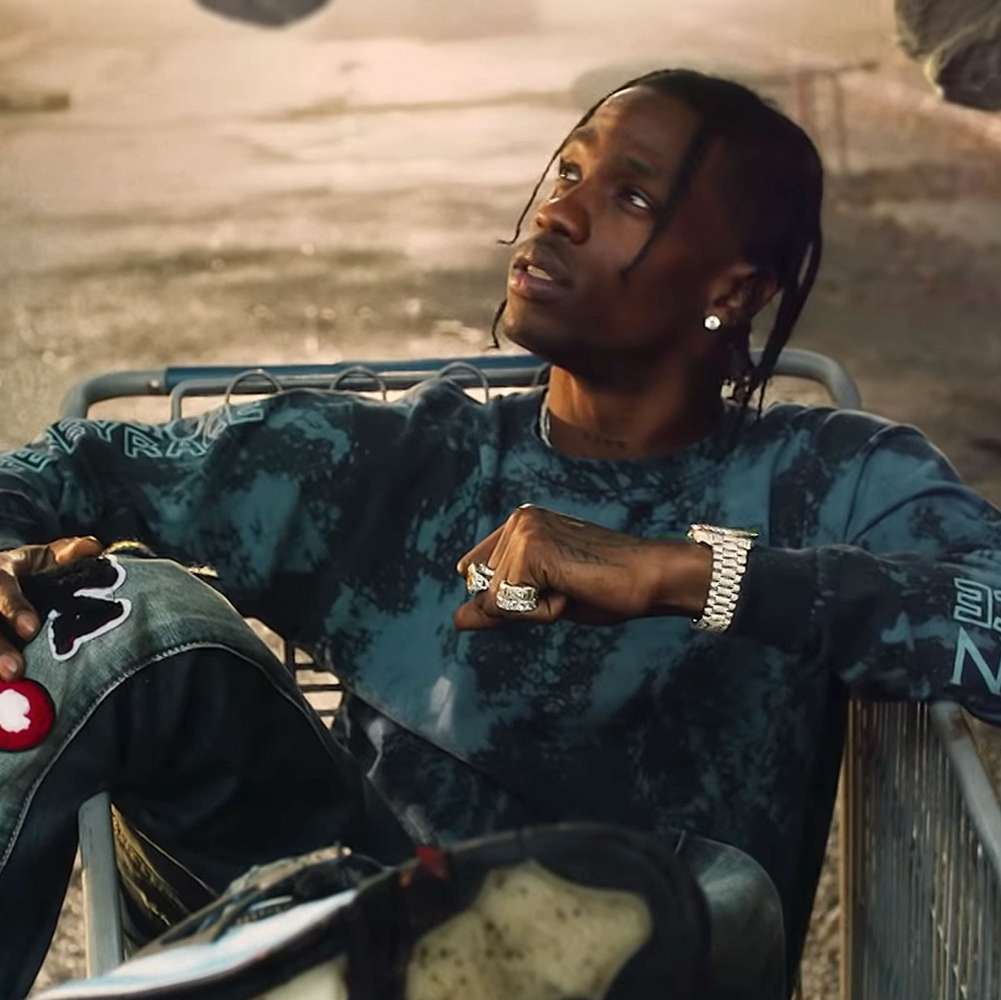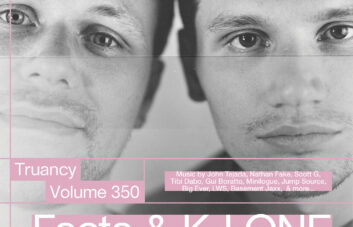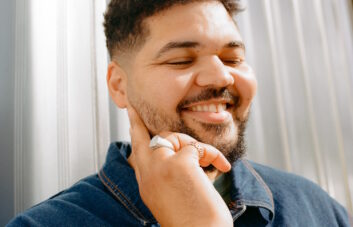Established as an effort to “preserve and proliferate Southeast Michigan’s rich history of dance music,” Detroit’s Vanity Press Records has seen releases from local and not-so-local artists such as AceMo, Black Noi$e, and Flora FM. Their latest 7” pairs the vinyl debuts of Ridgewood, NYC-via-LA’s Oscar Huang and Lisbon-based duo Rhythm Phazer, which consists of Heidy P, originally from Montreal, and Vandi of Toronto. Oscar Huang’s “Heel N Toe” is an airy house jam with dazzling synth lines that helps contribute to the overall lushness of the split record. Its misty basslines set the tone for a revitalising evening. On the other hand, Rhythm Phazer’s “Light Fog” is what you’d want to hear at dawn, watching the sun seep through the blacked out windows of the club. It marches in a different direction with its hazy pads and ‘80s-leaning synthwork, soft and twinkling. While the two songs draw influence from different sources, the Oscar Huang and Rhythm Phazer’s split 7” are evocative far beyond their cities.
It’s nice here. Isn’t that a lovely sentiment? It’s one that Doppelate is keen to espouse on his latest release. Having dropped a brace of 12”s on Let’s Go Swimming and a heartfelt tape on Share XL, he turns up on the always fun X-Kalay label with four tracks that run a singular path of emotive house while varying in execution. “I Can’t Get You Out Of My Head’ opens with wavy, woozy synths that wash up like lazy surf. Two minutes later, a neat acid line appears – it’d be comical if the surrounding elements weren’t so emotive. “Johnny Longneck” features yelps that recall Bobby Konders’ “Massai Women”, replete with deep chords and rippling percussion. “Pila Pala Kisses” takes things out for a sun-drenched party, with a simple piano line surrounded by definitely silly sound effects – whips and crashes and whatnot. There’s a maudlin melody that hums underneath that repeated phrase, with casual flourishes adding further colour. Finally, “Club Canyon” opts for crisp, broken drums and thick synthetic bass alongside further hazy synth lines. Dropping in early September, this one is a perfect complement for late summer warmth and melancholic introspection.
Introductions to the sound of Travis Scott generally happened through Yeezus, and his contributions to such a nebulous album along with his protege status under Kanye West have casted both light and shadow over his career. His reputation has been polarised – there are his stans and superfans, and there are those who still just aren’t sure what it is he actually does. As an artist, he’s continuously made efforts to establish himself since; he’d dropped a mixtape that summer, and he’d release another the next year, and an album for each year after that. Looking back at the highlights across these, his hallmarks become apparent: he favours warbled autotune singing alongside his bars (“Antidote”), is big on collaboration with a wide range of people for both vocals and production, is happy to let other artists take centre-stage for the good of the track (“pick up the phone”, “biebs in the trap”), loves guitar in a beat (“90210”, “3500”, “Mamacita”) as well as guttural, swampy instrumentals (“goosebumps”), still carries a little bit of Kanye influence in his beat switch-ups and flows, and trusts his creative instincts (Birds in the Trap Sing McKnight was essentially an artistic impulse and is why fans had to wait so long for his latest, Astroworld).
Astroworld is the most complete Travis Scott project to date, not only encompassing the staggering range of his creative ambitions but making good on them too. Production on the record stays true to the album’s closed down theme park namesake, from the chimes of “Carousel” and the fairground feel of “Houstonfornication” to “5% Tint”, which plays like a creaky cart ride through a haunted house, complete with spooky laughs, smoke machines and all. Through pairing its ensemble cast with leftfield instrumentation, the album captures the sensory overload and surrealness of theme parks. The Tame Impala-produced “Skeletons”, for example, places The Weeknd’s groans, Pharrell’s outbursts, Kevin Parker’s backing vocals and Travis Scott interpolating Yeezy’s flow over a damn harpsichord. This comes after “Stop Trying to be God” meshes a James Blake breakdown with harmonica played by none other than Stevie Wonder himself. Scott’s enthusiasm for guitar is incorporated in a breathtakingly organic way too. “Wake Up”’s muffled, Mount Kimbie-esque acoustic motif forms the perfect foundation for its Sunday morning frolic setting, and Turbo’s gorgeous loop opening “Yosemite” feels like it could be a distant, delicate relative of the sample Ruff Sqwad used for “Together”. “Coffee Bean” rounds off the record with throwback boom-bap and electric guitar in the style of West once more.
One of the greatest things about the record is how it uses its featured artists and samples to subvert and surprise listeners. Take “Sicko Mode”, which spends the first minute building momentum for Drake, pop-rap’s cultural juggernaut, only to completely cut him off. Scott’s verse is aided by the fantastic one-two punch of Biggie and Uncle Luke samples. And when the world’s most meme-able rapper finally meets one of its most dedicated ad-lib fanatics, a verse of “Like a light” rallies is the inevitable outcome. The track also features two-word interjections from Swae Lee, the man whose name alone establishes hits these days. Yet he’s there to foreshadow a fuller feature on the following extended interlude of a track, “R.I.P. Screw”, where the artists essentially say grace through harmonies and tributes. Other instances include Nav’s muted verse on “Yosemite”, which becomes less of an outro and more of an epilogue. And of course there’s 21 Savage’s deadpan delivery of the album’s most outrageous punchline on “NC-17”: “Yo’ bitch gave the Kid Cudi but I’m not signed to ‘Ye / I nutted on her cheek, her new nickname is Babyface.”
Astroworld is also home to truly astonishing vocals. For Scott, it’s some of his most accomplished work to date. This is evident from the off, as “Stargazing” marries an infectious hook with an out-of-body falsetto experience. His pre-chorus on “No Bystanders” is backed by soaring, apocalyptic cries from the void and he provides a much needed melodic edge to the Quavo and Takeoff-featuring “Who? What!”. Frank Ocean’s dynamic appearance on “Carousel” is an early highlight, but the album is notable for its explosive cameos from newer acts. Juice WRLD makes his mark on “No Bystanders” while Don Toliver’s thick, nasal voice and Winter Olympic slalom run of a flow steals the show on “Can’t Say”. Gunna on “Yosemite” is a pure showcase in precision rap, parabolic in both senses of the word.
There’s a ride for everyone on Astroworld, and Travis Scott goes above and beyond in terms of proving himself musically on this record. The album brings out the best of its guests by and large, and it’s a stellar achievement in terms of hip-hop production. Oh, and “Butterfly Effect” – you know, that song with the beautiful beat, killer hook and magnificent harmonies, the one that was one of the greatest tracks of 2017 – that’s on there too.
Words by Sofia Luu, Aidan Hanratty and Tayyab Amin.




